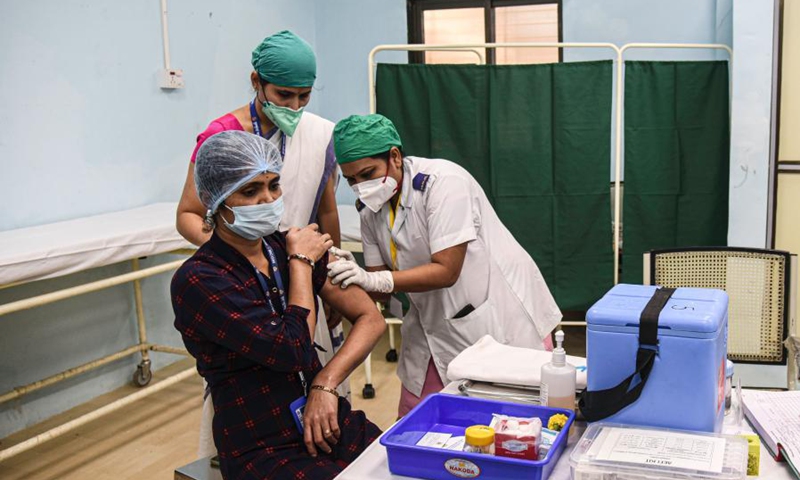
A woman receives the COVID-19 vaccine at Rajawadi Hospital in Mumbai, India, Jan. 16, 2021. Indian Prime Minister Narendra Modi launched the nationwide vaccination drive on Saturday to combat the COVID-19 pandemic.Photo:Xinhua
Four days after launching "the world's largest inoculation drive," India has already started to export COVID-19 vaccines manufactured in the country to neighboring countries, triggering concerns over its production capacity, given the pressure of domestic vaccination and global demand.
The first batch of 150,000 doses of Oxford/AstraZeneca's COVID-19 vaccine Covishield, which were manufactured in India, had been dispatched from Mumbai to Thimphu, Bhutan, on Wednesday, making Bhutan the first country to receive India-made COVID-19 vaccines, Times of India reported Wednesday.
Following Bhutan, shipments to the Maldives, Bangladesh, Nepal, Myanmar and Seychelles would commence this week, while those to Sri Lanka, Afghanistan and Mauritius are awaiting "necessary regulatory clearances." Some of the countries will receive the vaccines as a grant or gift, according to Indian media.
On Saturday, India launched what Prime Minister Narendra Modi claimed as "the world's largest inoculation drive" and vowed to vaccinate about 300 million people, starting from high-risk medical workers, by the end of July.
Feng Duojia, president of the China Vaccine Industry Association, told the Global Times on Wednesday that India needs 600 million doses for domestic vaccination of 300 million people before August, which is not impossible if the country has built up large-scale production lines and started production last year.
India has certain ability in vaccine development and production. India's vaccines - either independently developed or manufactured as an agency - have occupied a certain portion of the international market and formed some of their own channels, Feng noted.
However, some experts suspect that India is not able to meet domestic demand and fulfill its promises to supply vaccines to the rest of the world in a short period of time.
India's biggest vaccine producer and the manufacturer of Covishield, Serum Institute of India, would also supply 200 million doses of COVID-19 vaccines it manufactured to the World Health Organization-backed GAVI-COVAX alliance in the next few weeks, India Today recently reported.
"It will be very difficult for India to achieve its goal," Tian Guangqiang, an assistant research fellow with the National Institute of International Strategy at the Chinese Academy of Social Sciences, told the Global Times on Wednesday.
"India regards Bhutan as its sphere of influence which India has always wanted to take it under its wing and is afraid that Bhutan could import vaccines from other countries such as China. Indian sends vaccines to Bhutan to demonstrate the two sides' special connections despite a domestic shortage," Tian explained.
Other countries India plans to supply with vaccines are also regional countries with which India wants to maintain its influence and build up a "closer relationship" with, observers said. As long as India can supply quality vaccines to its overseas clients, it is welcome, they said.
But Tian said he does not think India is able to meet both domestic demand and global supply considering its production capacity.
India is using imported vaccines on its own people, meaning domestic vaccines cannot meet demand in either quantity, or quality, the expert said.
BBC reported on January 10 that India produces 60 percent of the world's vaccines, but the report also raised concerns of whether India is able to meet the demand of domestic vaccination and the global market.
Serum Institute of India said it can already turn out between 60 and 70 million vaccine doses a month. They had 50 million doses quality-tested and ready to be rolled out, according to BBC.
Another Indian producer, Bharat Biotech, said it is aiming to produce 200 million doses a year, but only have 20 million doses of Covaxin available, BBC said.




